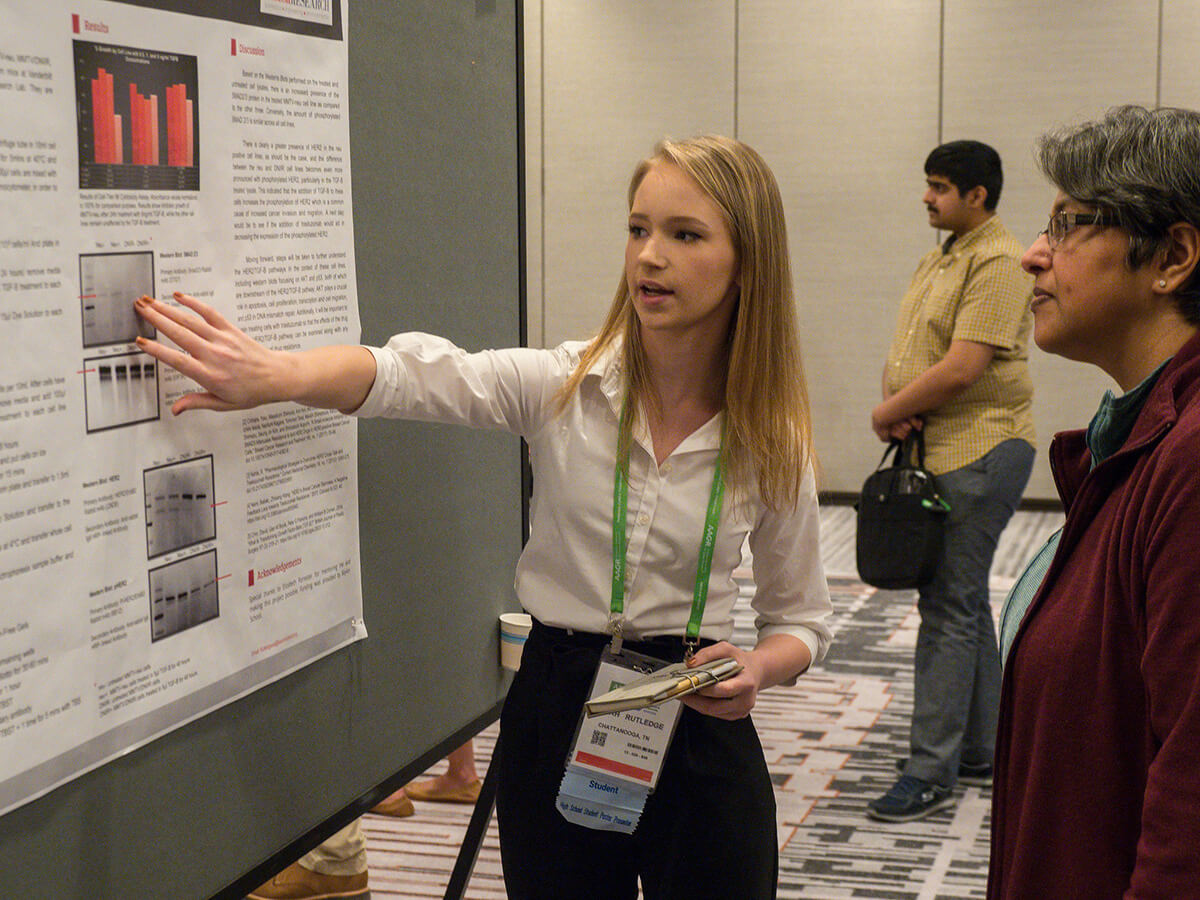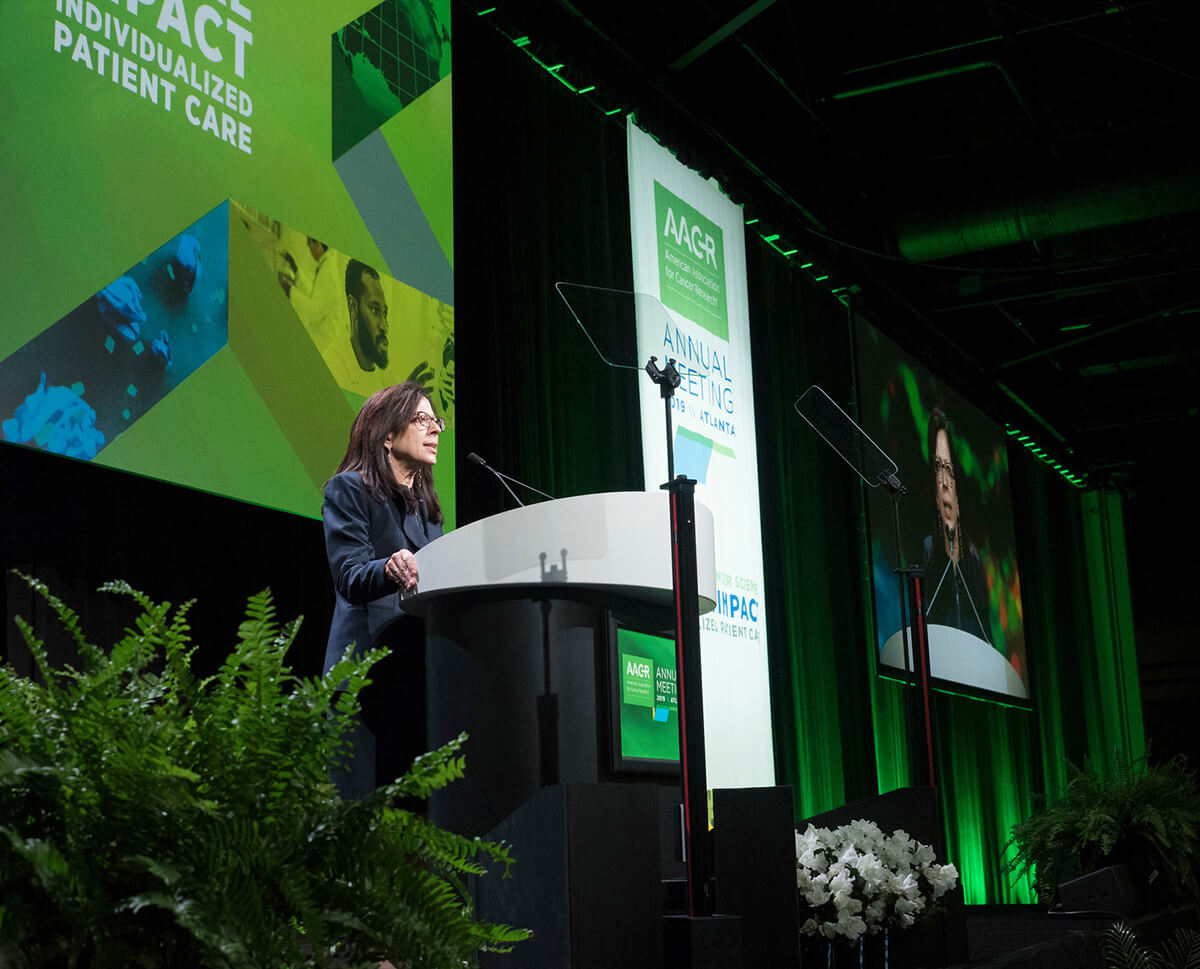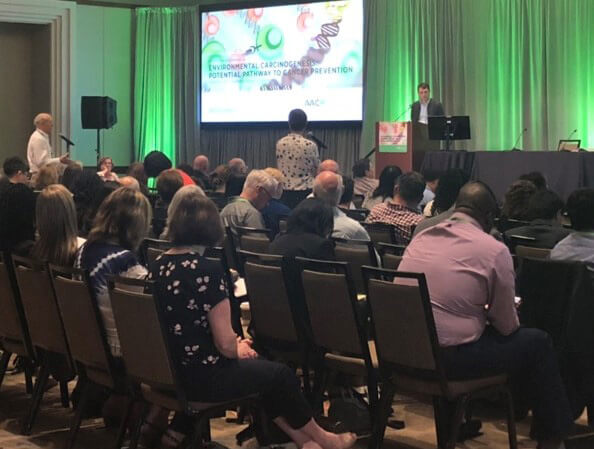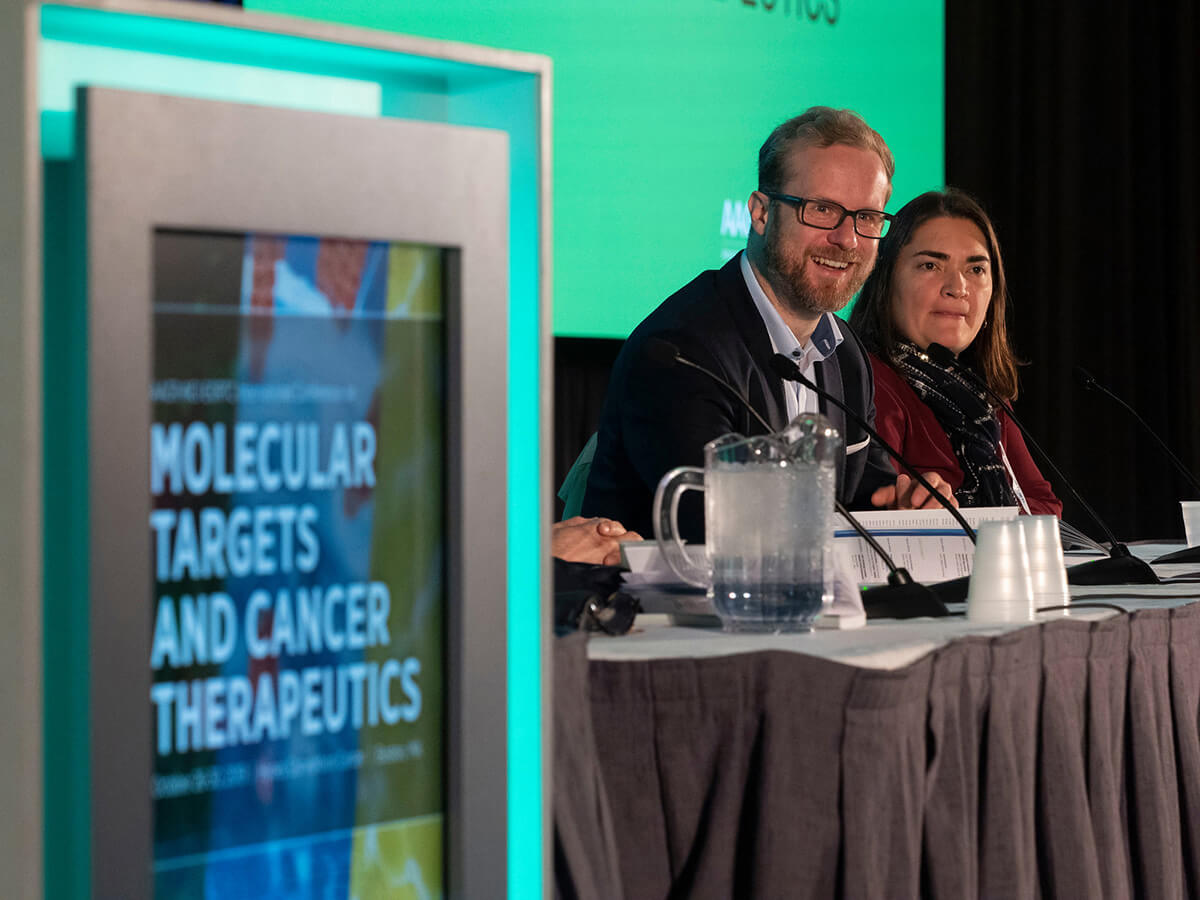Scientific Leadership: Catalyzing Collaborations
The AACR uses the power of collaboration, bringing together laboratory scientists, clinicians, survivors, patients, advocates, and regulators to attack the cancer problem and develop bold solutions.
AACR Project GENIE: Powering Precision Medicine
Precision medicine requires an end-to-end learning health care system, wherein the treatment decisions for patients are informed by the prior experiences of similar patients. Oncology is currently leading the way in precision medicine, because the genomic and other molecular characteristics of patients and their tumors are routinely collected at scale. A major challenge to realizing the promise of precision medicine is that no single institution is able to sequence and treat sufficient numbers of patients to improve clinical decision making independently. To overcome this challenge, the AACR launched Project GENIE (Genomics Evidence Neoplasia Information Exchange).
AACR Project GENIE is an international pan-cancer registry of real-world data assembled through data sharing among 19 leading international cancer centers. The registry pools clinical sequencing data from participating cancer centers to create an evidence base that is available to everyone. The consortium and its activities are driven by openness, transparency, and inclusion, ensuring that the project output remains accessible to the global cancer research community for the benefit of all patients.
Momentum for the project continued to build in 2019. At a special session during the AACR Annual Meeting 2019 in March, David Hyman, MD, from Memorial Sloan Kettering Cancer Center and Monica Arnedos, MD, from the Gustave Roussy Cancer Center reported on the early results from two retrospective natural history studies in rare metastatic breast cancer populations using data from the registry. The studies were presented in the context of the recent FDA framework on using real-world data to support regulatory activities, in particular natural history studies in rare populations. Both studies have now been finalized and the papers submitted for publication. In July, an additional 11,242 sequenced tumors and the associated baseline clinical data were posted to the registry, bringing the total number of unique records to nearly 71,000. This sixth public release—which contains data from nineteen participating institutions—covers 98 major cancer types and 656 unique subtypes.
In October, AACR Project GENIE took a major step forward with the announcement of the Biopharma Collaborative (BPC), a five-year, $36 million research collaboration with a coalition of nine biopharmaceutical companies. The goal of the BPC—in which biopharma team members will serve as active participants with governance roles—is to greatly expand the scope and accelerate the speed of clinical data collection from an estimated 50,000 de-identified patients treated at the AACR Project GENIE participating institutions. The additional clinical data that will be gathered through the BPC—which will be made publicly available twelve months following completion of data quality control processes—will enable Project GENIE to fully realize its goal to advance precision oncology and power clinical decision making at scale for the benefit of cancer patients.
Future of Cancer Research Innovation Summit: Combination Therapies
While her term concluded with the AACR Annual Meeting in April, 2018–2019 AACR President Elizabeth M. Jaffee, MD, FAACR, continued to provide scientific leadership for this vital AACR initiative in 2019. Along with her cochairs—Jennifer Rubin Grandis, MD; Albert C. Koong, MD, PhD; Patricia M. LoRusso, DO; and AACR President-Elect Antoni Ribas MD, PhD—Dr. Jaffee joined leaders in the areas of immunotherapy, targeted drug therapy, and radiation oncology in June to discuss the obstacles to success in combining these therapies. The goal of the summit was to better understand the science and effectiveness of combining various modalities and to improve the development of combination cancer therapies through scientifically driven clinical trials.
Dr. Jaffee will also lead a second innovation summit on Convergence Cancer Science at a later date. This summit will convene experts from diverse areas—including life sciences, engineering, mathematics, and physics—to discuss emerging technologies and methodologies that are uncovering new cancer pathways.
AACR Hematologic Malignancies Task Force
The AACR Hematologic Malignancies Task Force—which was formed to guide the AACR’s programs and initiatives dedicated to blood-based cancers—held its inaugural meeting in July. Chaired by Jonathan D. Licht, MD, the task force gathered international leaders and stakeholders from academia, industry, and government to evaluate the current state of the field and identify innovative solutions to accelerate progress for the benefit of blood cancer patients.
Scientific Working Groups
AACR scientific working groups facilitate progress in fundamental or emerging areas of cancer science through collaboration. By building communities around areas of scientific interest, the AACR builds networks of experts in vital areas of inquiry and focuses their efforts to overcome critical research challenges.
Current AACR working groups include Cancer Immunology (Chair: Weiping Zou, MD, PhD), Chemistry in Cancer Research (Chair: Andrew J. Phillips, PhD), Molecular Epidemiology (Chair: Shelley S. Tworoger, PhD), Pediatric Cancer (Chair: Kimberly Stegmaier, MD), Radiation Science and Medicine (Chair: Mary Helen Barcellos-Hoff, PhD), and Tumor Microenvironment (Chair: Sheila A. Stewart, DPhil).
Pediatric Cancer Working Group: Advancing Pediatric Cancer Drug Discovery
Throughout the year, members of the AACR Pediatric Cancer Working Group worked with members of ACCELERATE, the ITCC-SIOPE Multistakeholder Paediatric Platform, to identify opportunities for collaboration. The participants identified the factors that impede the development of novel drugs for pediatric cancer indications and discussed approaches to overcoming these barriers.
Molecular Epidemiology Working Group: Transforming Population Science
The Molecular Epidemiology Working Group (MEG) played a vital role in the AACR’s efforts to reimagine the field of population science. MEG Steering Committee members Melissa L. Bondy, PhD, and Peter Kraft, PhD, joined fellow cochairs Marc T. Goodman, PhD, and Sophia S. Wang, PhD, in developing the program for an AACR special conference on "Modernizing Population Sciences in the Digital Age." Held in February, the conference addressed how population science methodologies can be transformed to incorporate "big data," including data from wearable technologies and electronic medical records. The conference also addressed the use of mobile devices and social media outreach to support study recruitment and retention.
Science Education, Career Development, and Continuing Medical Education
While the AACR and the cancer research community have made great progress against cancer, future progress depends on a diverse workforce that is trained to explore and expand the frontiers of cancer science. Through its science education and professional development programs, the AACR sustains the pipeline of cancer researchers by recruiting, inspiring, and supporting emerging scientists at all career stages.
Student Members: Supporting the Future of Cancer Research
The AACR continued to build relationships with students interested in careers in science in 2019. The Science Education and Career Advancement Committee hosted the AACR Special Program for High School Students at the AACR Annual Meeting in April and at the AACR Conference on the Science of Cancer Health Disparities in September. More than 200 high school students across both programs participated in interactive lectures on cancer development and prevention and visited the poster sessions.
More than 200 undergraduate students also attended the AACR Annual Meeting to participate in the Fourteenth Annual Undergraduate Student Caucus and Poster Competition. Half of them presented their work in a poster session and received feedback on their research from AACR leaders. Presenters of the most highly rated posters received The Margaret Foti Foundation Undergraduate Prizes for Cancer Research, which are funded by AACR Chief Executive Officer Margaret Foti, PhD, MD (hc), to encourage college students to pursue careers in cancer research.
An additional 17 college students attended the Annual Meeting as AACR Undergraduate Scholars. Available to full-time, third-year undergraduate students majoring in science, the Undergraduate Scholar Awards support the participation of students in two consecutive Annual Meetings in order to inspire them to choose a career in cancer research.

Outreach to Clinical Fellows
Over the summer, the AACR launched a new recruitment initiative focused on clinical fellows at NCI-designated cancer centers. Fellows were encouraged to become AACR members, and new resources were developed to support them as part of the AACR’s ongoing efforts to develop a scientifically diverse workforce. This outreach initiative was extremely successful, increasing awareness of the AACR among clinical researchers and inspiring more than 160 fellows to join the AACR.
Continuing Medical Education
The AACR was reviewed by the Accreditation Council for Continuing Medical Education (ACCME®) and awarded Accreditation with Commendation for six years as a provider of continuing medical education (CME) for physicians (through March 2024). The AACR offered CME credit at 18 different meetings in 2019, including nine special conferences, four joint conferences, two educational workshops, one joint providership activity, and the AACR Annual Meeting. AACR journals provided another educational resource, offering credit to investigators for reviewing manuscripts. A total of 3,073 researchers and clinicians claimed CME credit from the AACR in 2019, taking advantage of opportunities to maintain their professional competence and incorporate new knowledge into their practices.
Meetings and Educational Workshops
Progress against cancer requires an understanding of the state of the art in cancer science, an ability to identify emerging areas of inquiry, and a willingness to explore nontraditional solutions. AACR meetings and educational workshops bring the cancer research community together to define the current scientific paradigm and to work together to expand it. For example, in October the AACR collaborated with Cancer Research UK (CRUK) to host a joint conference on Engineering and Physical Sciences in Oncology in London. This new conference—the first to be produced as part of the new strategic alliance between the two organizations—brought leaders in cancer research together with experts in engineering, mathematics, artificial intelligence, machine learning, and physics to explore ways these disciplines can both inform and transform oncology.
While AACR conferences highlight the latest cancer research, AACR educational workshops ensure that the cancer workforce is trained to understand and implement it. In November, the AACR marked the tenth anniversary of its educational workshop on Translational Cancer Research for Basic Scientists. Founded by Tom Curran, PhD, FAACR, and George D. Demetri, MD, in 2010, the workshop provides basic scientists with essential training to adapt their research for maximum clinical impact and transition into a new career in translational cancer medicine.
2019 SCIENTIFIC PROGRAMS
- MELANOMA: FROM BIOLOGY TO TARGET
January 15–18; Houston, Texas
Conference Cochairs: Elizabeth A. Grimm, PhD, Mario Sznol, MD, and Jedd D. Wolchok, MD, PhD - ELEVENTH AACR-JCA JOINT CONFERENCE ON BREAKTHROUGHS IN CANCER RESEARCH: BIOLOGY TO PRECISION MEDICINE
February 8–12; Maui, Hawaii
Conference Cochairs: Elaine R. Mardis, PhD, FAACR, and Hitoshi Nakagama, MD - MODERNIZING POPULATION SCIENCES IN THE DIGITAL AGE
In association with the AACR Molecular Epidemiology Working Group (MEG)
February 19–22; San Diego, California
Conference Cochairs: Melissa L. Bondy, PhD, Marc T. Goodman, PhD, Peter Kraft, PhD, and Sophia S. Wang, PhD
- AACR ANNUAL MEETING 2019
March 29–April 3; Atlanta, Georgia
Program Committee Chair: John D. Carpten, PhD
-
NIH-AACR CANCER, AUTOIMMUNITY, AND IMMUNOLOGY CONFERENCE
April 15–16; Bethesda, Maryland
Organizing Committee: Elizabeth M. Jaffee, MD, FAACR, Elad Sharon, MD, MPH, Connie Sommers, PhD, Howard Young, PhD, Katarzyna (Kasia) Bourcier, PhD, and Marie Mancini, PhD - AACR-AHNS HEAD AND NECK CANCER CONFERENCE: OPTIMIZING SURVIVAL AND QUALITY OF LIFE THROUGH BASIC, CLINICAL, AND TRANSLATIONAL RESEARCH
April 29–30; Austin, Texas
Conference Cochairs: Christine H. Chung, MD, Robert L. Ferris, MD, PhD, David Raben, MD, and James W. Rocco, MD, PhD -
 AACR INTERNATIONAL CONFERENCE: NEW HORIZONS IN CANCER RESEARCH
AACR INTERNATIONAL CONFERENCE: NEW HORIZONS IN CANCER RESEARCH
May 3–5; Shenzhen, China
Program Committee Cochairs: Elizabeth M. Jaffee, MD, FAACR, and Hong Wu, MD, PhD - THE HIPPO PATHWAY: SIGNALING, CANCER, AND BEYOND
May 8–11; San Diego, California
Conference Cochairs: Fernando Camargo, PhD, Anwesha Dey, PhD, and Kun-Liang Guan, PhD - BLADDER CANCER: TRANSFORMING THE FIELD
May 18–21; Denver, Colorado
Conference Cochairs: Charles G. Drake, MD, PhD, Jason A. Efstathiou, DPhil, MD, Donna E. Hansel, MD, PhD, Dan Theodorescu, MD, PhD, and Ellen C. Zwarthoff, PhD
-
 INTERNATIONAL CONFERENCE ON MALIGNANT LYMPHOMA (ICML)
INTERNATIONAL CONFERENCE ON MALIGNANT LYMPHOMA (ICML)
In cooperation with the American Association for Cancer Research (AACR)
June 18–22; Lugano, Switzerland
ICML President: Franco Cavalli, MD
Chair, Local Organizing Committee: Michele Ghielmini, MD

-
ENVIRONMENTAL CARCINOGENESIS: POTENTIAL PATHWAY TO CANCER PREVENTION
June 22–24; Charlotte, North Carolina
Conference Cochairs: Ernest T. Hawk, MD, MPH, Margaret L. Kripke, PhD, and Timothy R. Rebbeck, PhD - IMMUNE CELL THERAPIES FOR CANCER: SUCCESSES AND CHALLENGES OF CAR T CELLS AND OTHER FORMS OF ADOPTIVE THERAPY
July 19–22; San Francisco, California
Conference Cochairs: Crystal L. Mackall, MD, and Patrick Hwu, MD - PANCREATIC CANCER: ADVANCES IN SCIENCE AND CLINICAL CARE
September 6–9; Boston, Massachusetts
Conference Cochairs: Dafna Bar-Sagi, PhD, FAACR, Luis A. Diaz, Jr., MD, Elizabeth M. Jaffee, MD, FAACR, Ben Z. Stanger, MD, PhD, and Brian M. Wolpin, MD, MPH - ADVANCES IN OVARIAN CANCER RESEARCH
September 13–16; Atlanta, Georgia
Conference Cochairs: David D. L. Bowtell, PhD, George Coukos, MD, PhD, Alan D. D’Andrea, MD, and Karen H. Lu, MD -
 ADVANCES IN PEDIATRIC CANCER RESEARCH
ADVANCES IN PEDIATRIC CANCER RESEARCH
In association with the AACR Pediatric Cancer Working Group (PCWG)
September 17–20; Montreal, Quebec, Canada
Conference Cochairs: Crystal L. Mackall, MD, David Malkin, MD, Stefan M. Pfister, MD, and Kimberly Stegmaier, MD - TWELFTH AACR CONFERENCE ON THE SCIENCE OF CANCER HEALTH DISPARITIES IN RACIAL/ETHNIC MINORITIES AND THE MEDICALLY UNDERSERVED
In association with the AACR Minorities in Cancer Research Council
September 20–23; San Francisco, California
Conference Chair: Laura Fejerman, PhD
Conference Cochairs: Smita Bhatia, MD, MPH, Phyllis Pettit Nassi, MS, Sandi L. Pruitt, PhD, Mariana C. Stern, PhD, and Clayton C. Yates, PhD -
 FIFTH CRI-CIMT-EATI-AACR INTERNATIONAL CANCER IMMUNOTHERAPY CONFERENCE: TRANSLATING SCIENCE INTO SURVIVAL
FIFTH CRI-CIMT-EATI-AACR INTERNATIONAL CANCER IMMUNOTHERAPY CONFERENCE: TRANSLATING SCIENCE INTO SURVIVAL
September 25–28; Paris, France
Conference Cochairs: Christoph Huber, MD, Guido Kroemer, MD, PhD, Ellen Puré, PhD, and Giorgio Trinchieri, MD -
 CANCER RESEARCH UK-AACR JOINT CONFERENCE: ENGINEERING AND PHYSICAL SCIENCES IN ONCOLOGY
CANCER RESEARCH UK-AACR JOINT CONFERENCE: ENGINEERING AND PHYSICAL SCIENCES IN ONCOLOGY
October 15–17; London, United Kingdom
Conference Cochairs: Sangeeta N. Bhatia, MD, PhD, Kevin M. Brindle, PhD, Joe W. Gray, PhD, FAACR, and Molly Stevens, PhD

-
AACR-NCI-EORTC INTERNATIONAL CONFERENCE ON MOLECULAR TARGETS AND CANCER THERAPEUTICS
October 26–30; Boston, Massachusetts
Organizing Committee Cochairs: Elizabeth M. Jaffee, MD, FAACR, James H. Doroshow, MD, and Denis A. Lacombe, MD
Scientific Committee Cochairs: William R. Sellers, MD, James L. Gulley, MD, PhD, and Emiliano Calvo, MD, PhD -
 AACR-KCA JOINT WORKSHOP ON PRECISION MEDICINE
AACR-KCA JOINT WORKSHOP ON PRECISION MEDICINE
November 14–15; Seoul, Korea
Workshop Cochairs: Luis A. Diaz, Jr., MD, and Sun Young Rha, MD, PhD - TUMOR IMMUNOLOGY AND IMMUNOTHERAPY
November 17–20; Boston, Massachusetts
Conference Cochairs: Timothy A. Chan, MD, PhD, Charles G. Drake, MD, PhD, Marcela V. Maus, MD, PhD, and Arlene H. Sharpe, MD, PhD, FAACR - SAN ANTONIO BREAST CANCER SYMPOSIUM
December 10–14; San Antonio, Texas
Codirectors: Carlos L. Arteaga, MD, FAACR, Virginia G. Kaklamani, MD, and C. Kent Osborne, MD

2019 EDUCATIONAL WORKSHOPS
- ACCELERATING ANTICANCER AGENT DEVELOPMENT AND VALIDATION WORKSHOP
May 8–10; Bethesda, Maryland
Executive Committee: H. Kim Lyerly, MD, Richard Pazdur, MD, Gregory Reaman, MD, and Mary Scroggins, MA -
 EORTC-ESMO-ECCO-AACR Methods in Clinical Cancer Research
EORTC-ESMO-ECCO-AACR Methods in Clinical Cancer Research
June 15–21, 2019; Zeist, The Netherlands
Codirectors: Corneel Coens, MSc, Emiliano Calvo, MD, PhD, Nadia Harbeck, MD, PhD, and Lee M. Ellis, MD - INTEGRATIVE MOLECULAR EPIDEMIOLOGY: BRIDGING CANCER BIOLOGY AND PRECISION MEDICINE
July 15–19; Boston, Massachusetts
Director: Thomas A. Sellers, PhD, MPH
Codirectors: Peter Kraft, PhD, and Lorelei A. Mucci, ScD, MPH - MOLECULAR BIOLOGY IN CLINICAL ONCOLOGY WORKSHOP
July 21–28; Snowmass Village, Colorado
Director: Ross L. Levine, MD
Codirectors: Mark W. Geraci, MD, Christine M. Lovly, MD, PhD, and Jean Y. Tang, MD, PhD - ASCO/AACR METHODS IN CLINICAL CANCER RESEARCH WORKSHOP
July 27–August 2; Vail, Colorado
Codirectors: Manuel Hidalgo, MD, PhD, Jyoti D. Patel, MD, and Meredith M. Regan, ScD - TRANSLATIONAL CANCER RESEARCH FOR BASIC SCIENTISTS WORKSHOP
November 17–22; Boston, Massachusetts
Codirectors: George D. Demetri, MD, Susan Band Horwitz, PhD, FAACR, and Pasi A. Jänne, MD, PhD